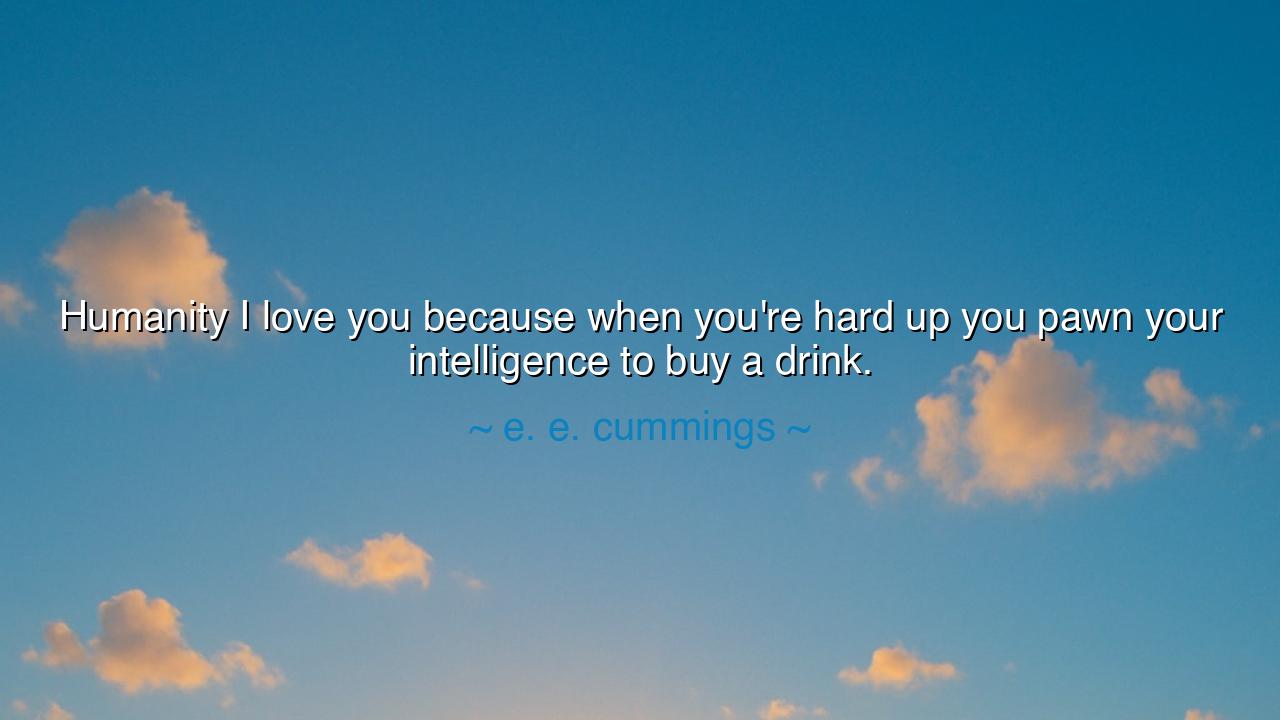
Humanity I love you because when you're hard up you pawn your
Humanity I love you because when you're hard up you pawn your intelligence to buy a drink.






The poet e. e. cummings, with the simplicity and rebellion of his pen, once wrote: “Humanity I love you because when you’re hard up you pawn your intelligence to buy a drink.” At first glance, these words may seem mocking — a jest at our weakness, our folly. Yet beneath their irony lies a deep, aching tenderness. For cummings, with the heart of both prophet and jester, saw in humankind not perfection but beauty in imperfection. He loved us not for our greatness, but for our foolishness, not for our wisdom, but for our capacity to err and still laugh, to suffer and still sing. This is not the love of a saint for the holy — it is the love of a brother for his flawed kin.
When he speaks of pawning intelligence to buy a drink, he speaks of that moment when reason yields to desire, when logic bows before the need for relief, for warmth, for escape. It is not wisdom but weariness that drives this act. Yet there is something profoundly human in it — the humble confession that even the greatest mind can falter, that even the wisest heart seeks comfort in folly. In that moment, our pride dissolves, and we become equal: beggar and philosopher, poet and king. It is this shared vulnerability that binds humanity together — this secret fellowship of imperfection.
In the ancient world, the Greeks spoke of the god Dionysus, the lord of wine and ecstasy, who shattered the cold walls of reason with laughter and tears. His worshippers would abandon their intellect, surrendering to frenzy, to song, to the wild pulse of life. To the sober mind, they seemed mad. But beneath the madness lay a truth: that man is not meant to be all mind, nor all control. There is wisdom in surrender, a divine kind of foolishness that reminds us that to be human is to feel. In this way, cummings’ line echoes an ancient truth — that intelligence without emotion becomes sterile, and emotion without wisdom becomes divine chaos.
Consider also the story of Vincent van Gogh, a man of immense sensitivity and vision. When poverty and despair pressed upon him, he did not cling to reason — he clung to passion. He painted not with calm calculation but with fever and fire, often trading his food or comfort for paint and canvas. In the eyes of the world, he pawned his “intelligence” — his practical sense — for a “drink,” a moment of artistic intoxication. Yet through that seeming folly, he gave the world a vision of eternity. What he surrendered in reason, he gained in truth. His madness, like the poet’s irony, revealed the depth of the human soul.
And thus cummings’ love is not condescending, but compassionate. He loves humanity because it breaks, because it fails, because it reaches for beauty even when blind. He sees that in our weakness lies our strength — the courage to stumble forward, the stubborn hope that refuses to die. When humanity pawns its intelligence for a drink, it reveals not stupidity, but hunger — the hunger to feel alive, to escape the weight of reason, to taste for a moment the sweetness of being.
This is the paradox of the human heart: we are both divine and absurd, wise and foolish, noble and broken. The gods may scorn us for our contradictions, but the poets — the true seers — love us for them. For in that trembling balance between reason and desire lies the mystery of creation itself. Without folly, there is no art; without pain, no compassion; without surrender, no joy. The mind alone cannot grasp the infinite; only the heart, humbled and burning, can do so.
So let this be the lesson for those who walk the earth after us: Do not despise your weakness. Do not curse your contradictions. There is sacredness even in your folly. Yes, guard your reason, but do not imprison your soul within it. When life grows hard and your spirit aches, remember that even to stumble is to be human, and even to weep is to be alive. Learn, like the poet, to love humanity — not for what it ought to be, but for what it is: fragile, foolish, and gloriously alive.
And in your own life, let your intelligence serve your humanity, not enslave it. Think deeply, but also laugh freely. Dream wildly. Fail bravely. If you must pawn your reason for a moment of joy, do so — but drink not only from the cup of forgetfulness, but from the cup of love, art, and compassion. For in the end, it is not reason that redeems the world, but the wild, trembling, beautiful heart of humanity itself.






AAdministratorAdministrator
Welcome, honored guests. Please leave a comment, we will respond soon